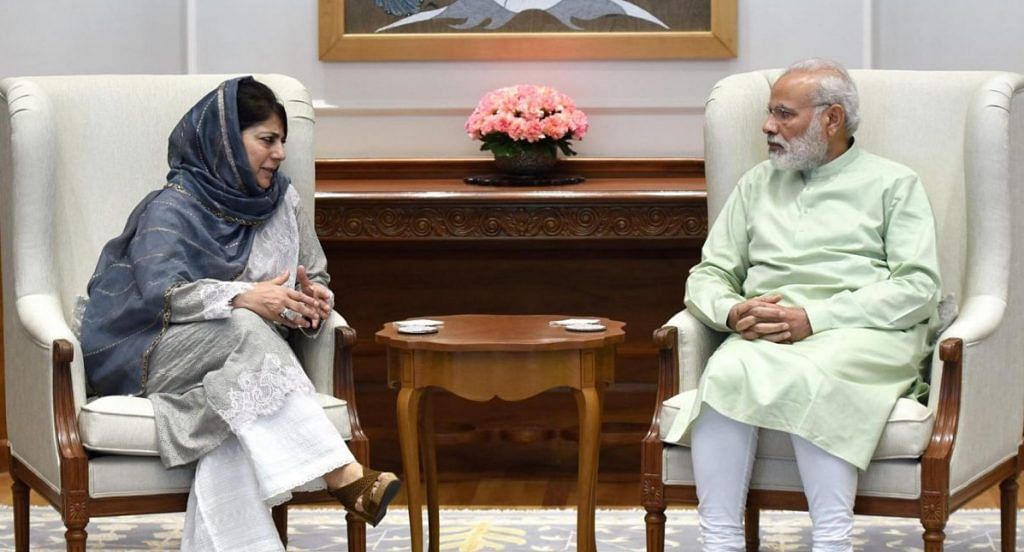Kashmir valley is on the boil and its religious divide with Jammu is complete.
Why are people mourning the demise of the Mehbooba Mufti government in Jammu and Kashmir? Its fate was sealed the day the government was sworn-in based on an unnatural alliance. What is surprising is that it survived this long.
The alliance was hailed as innovative, reflective of the out-of-the-box thinking of Modi administration. But what was ignored was the obvious ideological contradiction. The Hindutva ideology of the BJP/RSS and the Kashmiri nationalism have no meeting ground. It is the fundamental reason for the deteriorating situation in Kashmir.
M.S. Golwalkar writes in his book Bunch of Thoughts – “It has been the tragic lesson of history of many a country in the world that the hostile elements within the country pose a far greater menace to national security than aggressors from outside … it would be suicidal to delude ourselves into a believing that they have turned patriots overnight after the creation of Pakistan. On the contrary, the Muslim menace has increased a hundred fold by the creation of Pakistan, which has become the springboard for all their future aggressive designs on our country.”
Kashmir is a Muslim-majority state and it has been in turmoil since the day of its integration with India.
For the liberal Indians, the Kashmir problem is a question of national security and an issue of assertion of ethnic identity, but for the Hindutva warriors, Kashmir is part of a larger fight with Islam. It is a religious war and part of the continuous battle for the last 1,200 years. This battle has no soft approach, and no room for a healing touch policy. It will be fought like armies fight an external aggressor. Modi government’s approach to the Kashmir problem is dictated by this RSS ideology.
Former prime minister Atal Bihari Vajpayee pursued the policy of “Insaniyat”, he allowed Mufti Mohammad Sayeed to reach out to militants. No doubt, Vajpayee was an RSS man but his was not an RSS government. It was a coalition of more than two dozen political parties. There was a common minimum programme, and Vajpayee was not Modi. He was more resilient and flexible in his approach unlike Modi.
Modi government has a majority of its own in the Lok Sabha and is not dependent on others’ support. He is free to pursue the ideological agenda he desires. Vajpayee was the PM and Modi was the chief minister of Gujarat when riots took place in the state. But Vajpayee was not blamed for the riots, Modi was.
Since 2014, the minorities have been facing the brunt of the Hindutva onslaught. Lynching of Muslims in the name of cow protection, mass closure of abattoirs in Uttar Pradesh and other BJP-ruled states, the constant harassment of Muslims in the guise of so-called ‘Love Jihad’, the campaign against instant triple talaq, the debate to change Muslim names of roads and monuments, and the attempt to rewrite history and paint Muslims rulers as villains are some examples.
These are not aberrations of governance but a reflection of a deeper ideological mooring. Such developments in the rest of India have a direct bearing in Kashmir. This furthers the state’s sense of alienation. In this context, it is not difficult to understand why Kashmiri nationalism will never trust the Modi government.
Mehbooba Mufti, who once was considered the darling of the disenchanted Kashmiri youth, is today a much-maligned leader in the state. She is blamed for opening the doors of Kashmir for the grand entry of the RSS. The alliance, which was hailed as a breakthrough, became a curse.
The future now looks bleak for both the PDP and Mehbooba Mufti. And four districts of south Kashmir – Pulwama, Anantnag, Shopian, and Kulgam – are so badly affected that they have almost become a liberated zone. It was, therefore, not surprising that few people turned up for the funeral of Mufti Mohammad Sayeed. That was the warning signal for Mehbooba Mufti, but she refused to read the signs and is now paying the price.
But the bigger price is being paid by the country. Kashmir valley today is on the boil – the situation can be easily compared with the 1990s – and the religious divide between the Valley and Jammu is complete. It will take years for Kashmir to be normal again and undo the impact of the Hindutva politics on the Valley.
Ashutosh is a spokesperson for the Aam Aadmi Party.
